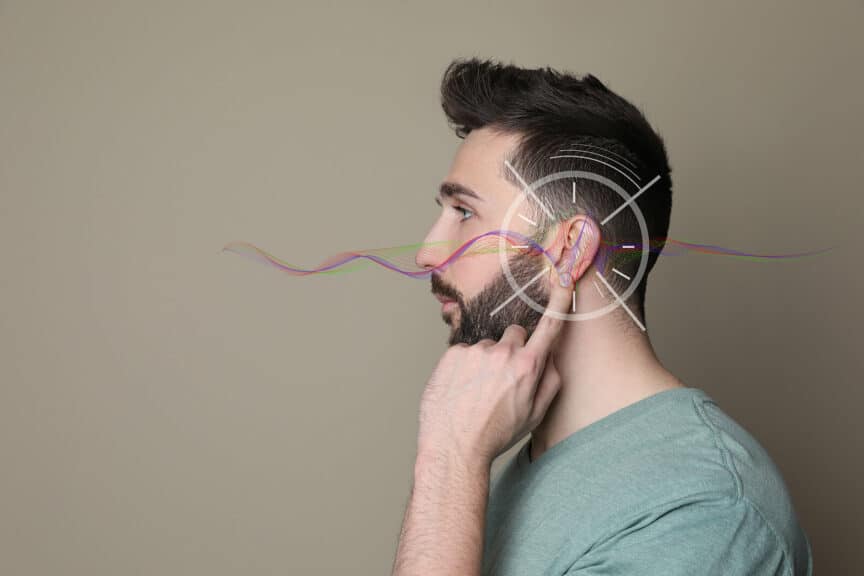Hearing loss is a common medical condition that people live with today. Nearly 1 in 5 people have some degree of impaired hearing which affects over 48 million people. A common misconception about hearing loss is that it is only caused by aging. While this is one factor, there are other factors that contribute to the development of hearing loss. You may be surprised to learn that head injuries are one of them.
How common are head injuries?
According to the Centers for Disease Control and Prevention (CDC), more than 3 million head injuries occur every year. A concussion is a mild form of a head injury and the most severe type is a traumatic brain injury (TBI). The CDC estimates that at least 1 million head injuries are traumatic brain injuries. While anyone can experience a head injury, the most impacted demographic is men who are 15-35. One factor that contributes to this is engagement in contact sports and other physically demanding activities where experiencing a head injury is a higher risk. Other common ways people experience a head injury is by car or bike accidents as well as falls.
What is the impact of head injuries?
Head injuries can affect health and everyday life in numerous ways. A head injury involves extreme force to the head which causes the brain to shake. The brain runs up against the skull and this abrasive movement can result in swelling, bruising, hemorrhaging, contusions etc. This can produce various symptoms including the following:
- Challenges maintaining balance, vertigo
- Bouts of dizziness
- Headaches, migraines
- Sensitivity to light and/or noise
- Tinnitus: a ringing, clicking, or buzzing like noise in one or both ears
- Difficulty knowing which direction sound is coming from (known as sound localization)
Head injuries that are more severe can produce chronic symptoms that include:
- Sleep issues, sleep disorders
- Personality and behavioral challenges: depressive symptoms, mood swings, communication issues, social withdrawal etc.
- Challenges with mobility
- Reduced capacity to perform cognitive functions (decision making, communication, memory)
Another chronic symptom that head injuries can cause is hearing loss which is a medical condition that reduces a person’s ability to hear and process speech as well as sound.
How can head injuries cause hearing loss?
Head injuries can impact hearing health in a few ways. Knowing how the auditory system – the sensory system for hearing – works is a useful way to understand how hearing injuries can damage hearing. The auditory system includes the ears and brain which work together to absorb and process sound. This complex process involves:
- Outer ear: the outer cartilage of the ear picks up soundwaves from the environment which travel through the ear canal and land on the eardrum.
- Middle ear: active engagement of the eardrum triggers the ossicles, three tiny bones that are connected. Movement of the eardrum and ossicles help push soundwaves further into the inner ear.
- Inner ear: there are thousands of sensory cells in the inner ear which help convert incoming soundwaves into electrical signals. These signals get carried to the brain (via auditory pathways).
The brain is then able to further process these signals, assigning meaning to them which allows us to understand what we hear. Head injuries can impact this process in several ways including: damaging the ossicles and/or eardrum, damaging sensory cells, constricting blood flow etc. This impairs these components from performing their essential function which impacts how sound is absorbed and processed.
Tips to Protect Your Hearing Health
It is important to practice safety measures that reduce your risk of experiencing a head injury and protect your hearing health. A few tips include:
- Wear protective gear: wearing protective gear while engaging in sports, other physical activities like biking ,and while driving can prevent a head injury. Be sure to always wear a helmet and seatbelt!
- Wear hearing aids: if you have hearing aids, it is important to wear your hearing aids during waking hours. Hearing aids support your hearing needs in everyday environments. With hearing aids, people are better able to hear and be in tune with the spaces they are navigating. This increases spatial awareness and safety, reducing the risk of experiencing a fall and head injury.
- Test hearing regularly: integrating a hearing test in annual health check-ins is a great way to monitor your hearing health. Your hearing needs can change over time so getting evaluated regularly allows you to track and identify any symptoms that need to be addressed.
Contact us today to learn more about how you can protect your hearing from head injuries and the resources available to support you.

